Explore the best credit cards for students that offer low fees, rewards, and tools to build credit—read on to find the perfect card to kickstart your financial journey!
Student credit cards are an excellent tool for young people to begin establishing credit at an early age. Students can also make purchases that they might not have otherwise been able to make. Certain credit cards may offer discounts or other benefits to students at certain colleges and universities.
It is essential to consider which best credit cards for balance transfers with no fee issuers will provide you with the most value because the majority of them offer bonuses or other benefits to new cardholders.
To optimize your financial situation and set yourself up for success, it is essential to understand what features make the best student credit card and how they can benefit you.
And know answers to all questions, especially is it worth consolidating debts. Let’s get going!
Credit Cards For Students: Best Choices
Numerous student credit cards provide benefits such as low-interest rates that can assist students in paying for college. There are a lot of costs for full-time students, like textbooks, transportation, and food. College tuition and textbook costs alone are enough to make anyone’s head spin.
However, you can take advantage of good cashback, rewards programs, and other benefits when you pick the right one. Therefore, choosing the best credit cards with the best rewards, perks, and benefits that can help you save money and simplify your life is critical. Here are some of our top picks that every student should check out.
Discover it® Student Cash Back
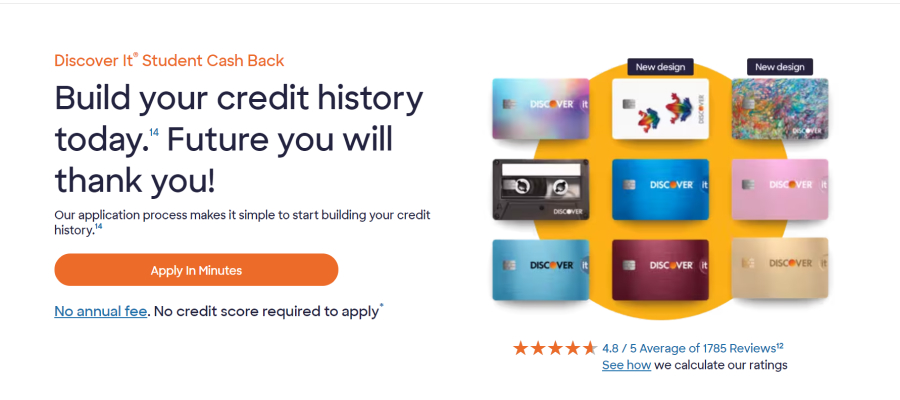 If you’re a student looking to earn cash back on your purchases without having to pay an annual fee, then the Discover it Student Cash Back credit card might be the perfect fit for you. This card offers no annual fee and no foreign transaction fees, and you don’t even need a credit score to apply.
If you’re a student looking to earn cash back on your purchases without having to pay an annual fee, then the Discover it Student Cash Back credit card might be the perfect fit for you. This card offers no annual fee and no foreign transaction fees, and you don’t even need a credit score to apply.
With the Discover it Student Cash Back card, you can earn 5% cash back on a variety of purchases all year long. Plus, for the first six months, customers enjoy an introductory APR of 0 percent on purchases and debt transfers.
After that, the APR will range from 14.99% to 25.24%. This card is a great choice for students just starting to build their credit, as the lack of an annual fee means you won’t have to worry about any unexpected costs.
Bank of America® Travel Rewards Credit Card for Students
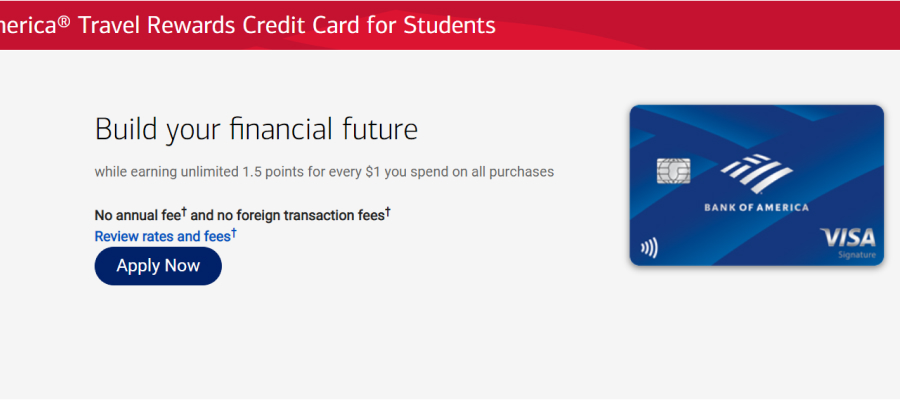
If you’re a student looking to build your credit and earn rewards on your travel and dining expenses, the Bank of America Travel Rewards Credit Card could be a great option for you.
This best hotel rewards credit card with no annual fee allows you to accumulate points through the Bank of America Travel Center that can be used towards travel expenses like hotels, flights, rental cars, and cruises.
Whether you’re planning a trip with friends or want to treat yourself to a luxury vacation, this credit card can help you save on travel costs while also helping you build your credit history.
It’s a simple way to get started with rewards programs that use points. With no yearly cost whatsoever, you will receive 1.5 points for every dollar spent on all of your transactions.
They offer a generous bonus of 25,000 points if a customer spends 1,000 USD or more within the first ninety days of opening an account. These points can be redeemed for a statement credit of 250 USD for travel-related expenses, giving you a head start on your next vacation.
Additionally, this credit card offers an introductory APR on purchases and debt transfers made during the first 60 days, which lasts for the first 18 payment cycles. After the intro offer ends, you’ll be subject to a variable APR ranging from 17.74% to 27.74%. Keep in mind that any balance transfers made with this card will incur a 3% fee, with a minimum of 10 USD.
Bank of America® Unlimited Cash Rewards Credit Card for Students
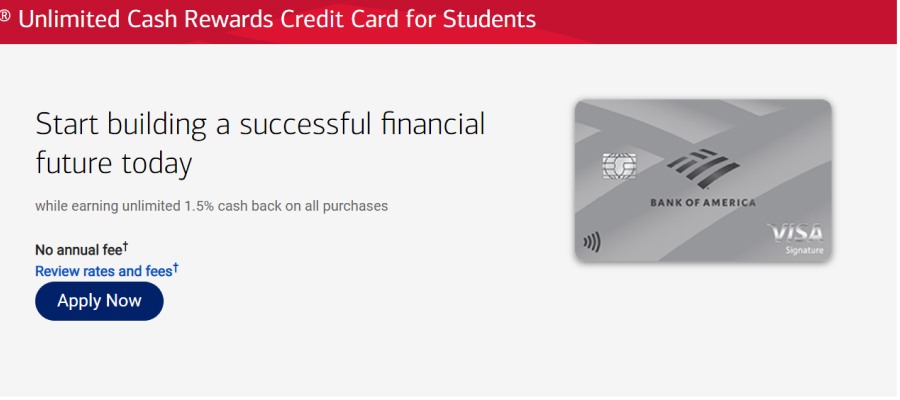
If you’re a student looking for a credit card that offers cash back on your purchases without charging an annual fee, consider the Bank of America Unlimited Cash Rewards.
With this card, you can earn a $200 cash reward when you spend at least $1,000 on your purchases within the first 90 days of opening an account. Plus, you’ll earn 1.5% cash back on all other purchases, with no annual cap amount on the cashback that can be earned.
This card is a great choice for students looking for a low-hassle credit card option, as it offers a 0% APR for the first 18 billing cycles on purchases and balance transfers made in the first 60 days of opening the account.
After the intro offer ends, you’ll be subject to a variable APR ranging from 17.74% to 27.74%. Keep in mind that balance transfers with this card are subject to a 3% fee, with a minimum of $10.
Bank of America® Customized Cash Rewards Secured Credit Card
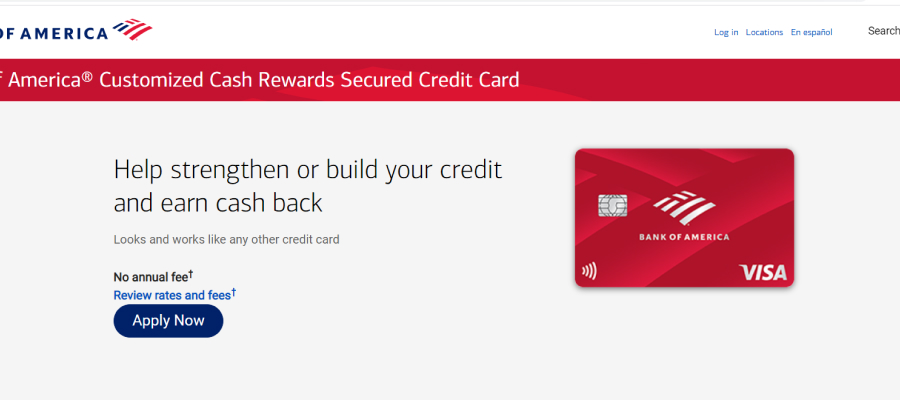
If you’re looking to earn rewards on your purchases but don’t yet have enough of a credit history to qualify for more competitive cards, the Bank of America Customized Cash Rewards Secured Credit Card might be a good option for you.
This card offers 3% cash back on all purchases and 2% cash back on gas and grocery store purchases. When you open an account, you can earn a $200 cash reward if you spend at least $1,000 on purchases within the first 90 days.
This card is a great choice for people who want to start earning rewards on their spending and building their credit history, and the cash back on gas and grocery store purchases can be especially helpful for those who have a lot of everyday expenses.
In the first 60 days after opening the account, they’ll give you 0% APR on the balance you’ve made during the first 18 billing cycles. Upon expiration of the intro APR deal, a variable APR of 17.74% – 27.74% will be applied.
Capital One SavorOne Student Cash Rewards Credit Card
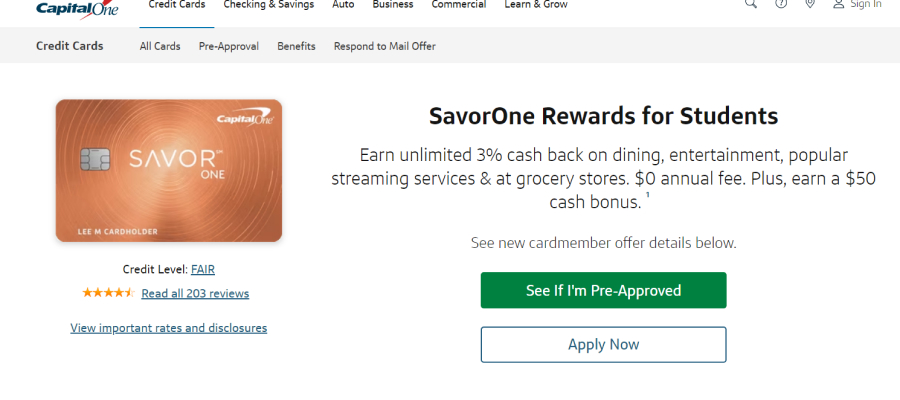
If you’re a student looking for a credit card that offers cash back on your purchases without charging an annual fee, this is a great option.
This card offers 1% cash back on all purchases, along with an introductory APR of 0% for the first 6 months.
After that, you’ll be subject to an ongoing APR of 17.99% – 27.99% Variable. This card is a great choice for students who want to earn some rewards on their spending without having to worry about annual fees or high APRs.
New accounts have a special offer – in the first three months, you can earn $100 when you spend $100. This is one of the best welcome offers for a student credit card currently available. The SavorOne also lets you pay off your balance in full each month without penalty and earn refunds on purchases from participating merchants if you have any eligible returns processed within 60 days of your initial purchase date.
It’s ideal for students who want a simple rewards program that offers 1% back on all purchases, with an additional 1% back when they pay their bill on time each month. This card also comes with travel benefits like auto rental collision damage waiver (CDW) and trip cancellation/interruption coverage (TCI).
Deserve® EDU MasterCard for Students
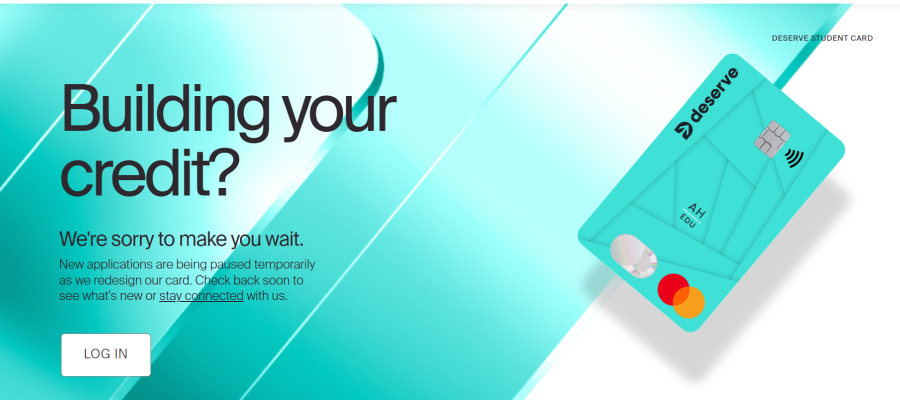 Another great choice for students looking to earn some extra cash on their purchases.
Another great choice for students looking to earn some extra cash on their purchases.
With this card, you’ll get a welcome bonus that you can use to pay for tuition, books, and other expenses. Plus, you’ll earn double cash back on all purchases made with the card.
As an added bonus, if you spend $500 in the first 3 billing cycles, you’ll get an Amazon Prime student membership through Deserve. The credit score that’s required is 630-850. With this credit card, you have the opportunity to receive 1% cash back on every purchase you make.
Moreover, no foreign transaction or annual fees are charged. Plus, there are various perks that can assist you in saving money and accumulating rewards on your everyday purchases. The annual percentage rate for this card is approximately 22.49%.
On top of all that, timely payments can help boost your credit score as the card issuer reports to TransUnion, Equifax, and Experian – the three major credit bureaus. The credit limit is $5,000 for all users.
What Is a Student Credit Card?
Let’s begin by discussing what a student credit card is.
It is a type of credit card that students can get if they meet the requirements of the bank or network that gives them out.
They are ideal for college students who want to improve their credit while also earning cash back on purchases because of their high rewards programs and low interest rates. Despite the fact that this may appear to be a straightforward method for earning rewards points, it is essential to keep in mind that student loans must be repaid, and if you do not pay off your balance in full each month, you will also be required to pay interest in addition to the principal amount.
Why Should I Get a Student Credit Card?
Best student credit cards are a great way to establish good credit and learn how to manage money. It’s also a great way for your teen or young adult to start building a credit history. Credit card companies offer incentives to students, including rewards programs, cash back, and low introductory rates.
They are generally marketed toward students with little or no credit history. They tend to have low limits and offer limited features — but if you use them responsibly, they can help you build good credit over time.
That’s because they’re considered “introductory” cards, which means they come with an early period of relatively low spending limits that gradually increases over time as you continue using the card responsibly.
How To Get a Student Credit Card
It can be challenging to obtain cash as a college student. You can use your best student cards to get money and pay it back later if you are fortunate enough to have one. It can, for instance, come in handy when you need gas for your car or groceries for the week. However, there are a few things you should be aware of prior to applying for one if you do not already have one but have a strong desire for one.
1) Find out if your school offers a student credit card
2) Make sure that the lender is reputable and trustworthy
3) Make sure that there aren’t any hidden fees or charges associated with the card
4) Check to see if there is an annual fee associated with the card
5) Make sure that there isn’t a high APR rate associated with the card
How To Compare Credit Cards For Students
Credit cards can be a great way to learn how to manage your money. If you’re a student, there are many reasons why you might want to get one. For example, you may want a card that offers rewards or special perks that are only available to students.
You may also need it to rent an apartment or other type of housing. However, if you don’t know how to compare student credit cards, it can be hard to find the right one for your needs and lifestyle. When comparing them, there are a few things you should consider:
Annual Fees
Most credit cards for students have annual fees of less than $100. Some cards charge a fee, while others don’t. The advantage of paying an annual fee is that you usually get more benefits with the card, including rewards and perks.
The best annual fees are those that are low enough so that they don’t outweigh the benefits of using the card. If a card charges an annual fee but also offers valuable rewards or other features, then it’s worth paying the fee for those benefits.
If you plan on holding on to your credit card long-term, then an annual fee may not matter as much as other factors such as interest rate, foreign transaction fees, and rewards structure.
Interest Rates and Fees
Interest rates and fees are two of the biggest factors in comparing student credit cards. While interest rates are fairly straightforward, fees can vary widely between cards. Interest rates are the amount you pay for the privilege of borrowing money. They’re expressed as an annual percentage rate (APR) and can be fixed or variable.
Fixed rates remain the same over time, while variable rates change with the market. Fees are charges imposed by your 500 limit credit card issuer to use their card or account. Fees can vary widely between different cards and issuers, so it’s important to understand what each fee is for to make an informed decision about whether it’s worth paying them. A good interest rate is one that doesn’t exceed 10 percent APR or 15 percent if you have excellent credit (based on your FICO® Score).
Credit Reporting
Credit reporting is one of the most important factors in comparing the best student credit cards. Big companies use your credit score to determine whether you are a good candidate for a credit card.
The credit reporting process is an essential part of student financial literacy because it allows you to check your credit file and make sure that everything is accurate, correct, and up-to-date. Credit reporting is one of the factors that make up your credit score, which lenders use to determine if they want to loan money to you, at what interest rate, and what they’ll charge in fees and interest charges if they loan money.
Rewards
When you’re choosing a credit card, it’s important to consider the rewards program it offers. These programs come in various forms, but they all aim to make your life more convenient. Some reward cards offer cash back on all your purchases, while others offer points that can be redeemed for gift cards, travel, and more.
Rewards can be earned in two ways: cash back and travel rewards. For example, cash back cards usually give you a percentage of your purchase back as a rebate, which is typically between 1% and 5%. Travel rewards cards, on the other hand, give you points or miles that you can use for flights, hotel stays, and other travel expenses.
Security Deposits
Security deposits are required when you open a credit card account. They are an extra layer of protection for the company if you don’t pay your bills on time. The amount of money that you have to put down as a security deposit depends on the bank or credit union and the type of account you’re opening.
A good security deposit should be somewhere between $200 and $300. This should be enough money to cover any payments that you might miss, while still being affordable enough that it won’t break your budget if something goes wrong with your finances. Security deposits can vary widely from bank to bank, so it’s important to compare each one carefully before deciding which one is right for your needs.
How To Make the Most of Your Student Credit Card
The first thing that you need to do is make sure you’re using your student credit card responsibly. It’s not a free pass to go out and spend money on frivolous things — it’s a tool that lets you build up your credit history and learn how to spend responsibly. If you’re going to be using your student card a lot, make sure that you pay off the balance every month.
This will ensure that you don’t fall behind on payments or get hit with interest charges at the end of the month. If you can’t pay off the balance in full each month, then try making larger payments towards the end of each billing cycle so that it doesn’t add up too much over time. If you have bad spending habits or tend toward impulse purchases, then consider putting an amount of money aside each month for emergency expenses only.
How To Avoid Student Credit Card Debt
If you’re a college student, it’s important to understand how they work and how to use them wisely. It’s easy to get into debt with credit cards, especially as a student. Here are some tips for avoiding debt
- Use It When Absolutely Necessary: The best way to avoid paying high-interest charges on your student credit card balance is to not use your card at all.
- Pay Off Your Minimum Balance In Full Each Month: The next best thing is to pay off your minimum balance in full each month so that no interest accrues. This will help keep your balance low and cut down on fees and interest charges from being applied to your account.
- Avoid High-Interest Rate Balance Transfers and Cash Advances: If you’re unable to pay off your balance each month, then try not to transfer the balance onto another account or take a cash advance on it.
Alternatives to Getting a Student Credit Card
Student credit cards can be a great way to build credit and learn about money management. But if you don’t have a steady income or if you’re worried about racking up debt, there might be other options for managing your money. Here are some alternatives to student credit cards:
- Personal savings account: A savings account is a good option for students who have no desire to carry a balance from month to month and don’t want to pay an annual fee.
- Checking account: A checking account offers immediate access to cash, making it easier for students who aren’t yet familiar with budgeting and saving. However, you’ll likely pay monthly maintenance fees unless you keep a large balance in the bank.
- Cash (and debit) back reward: A credit card that offers cash back rewards can be a helpful tool for students who want to earn money on purchases they’re already making, such as groceries or college textbooks, without accruing interest on those purchases. Debit cards with cash back rewards can offer a similar benefit.
Conclusion
A student credit card can be a great way to build up your credit score and start earning rewards that can be used for travel, dining, or entertainment. But not all student credit cards are created equal, so it’s important to do your research before applying. We hope that our list of top picks helped you find the one that’s right for you!